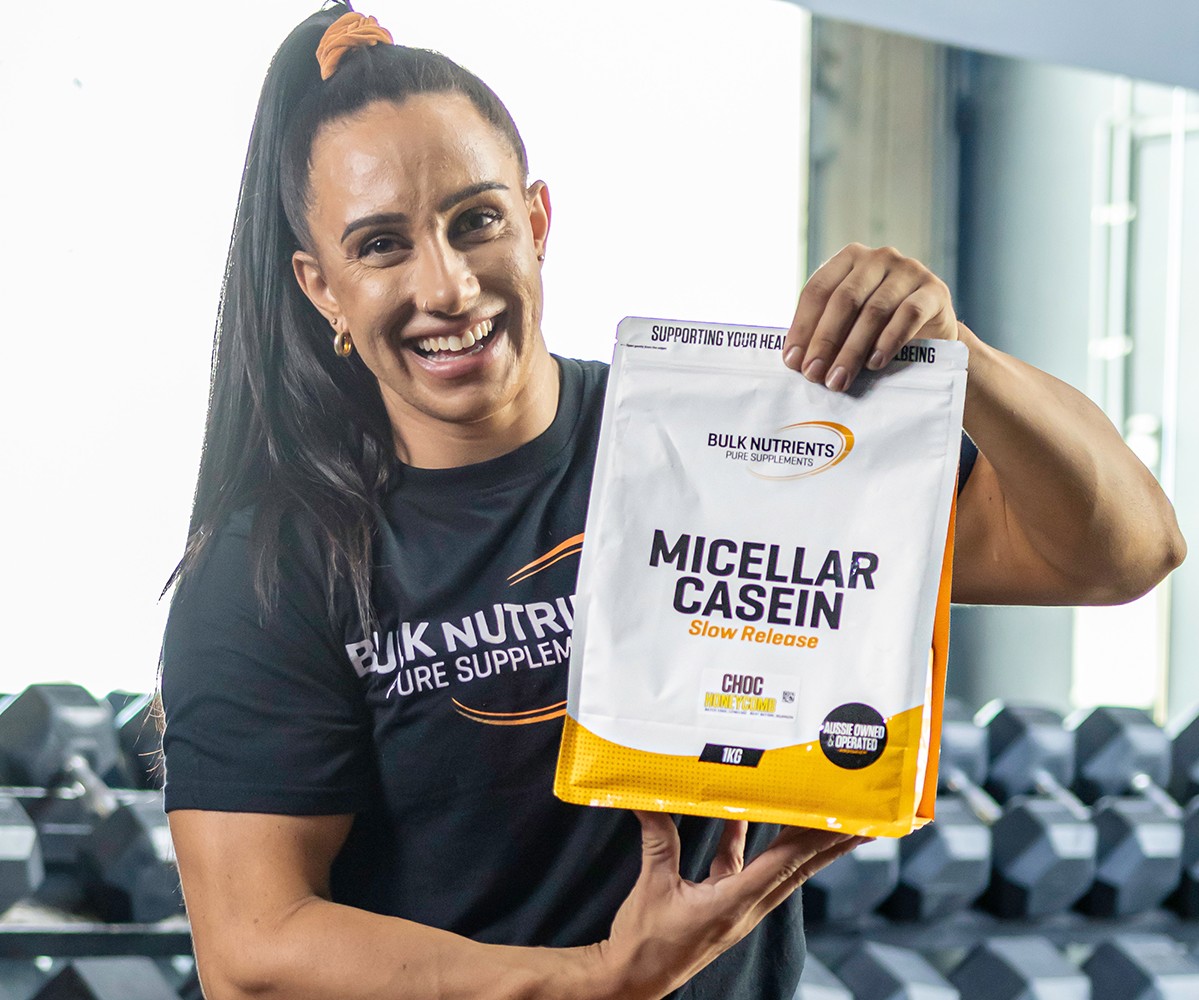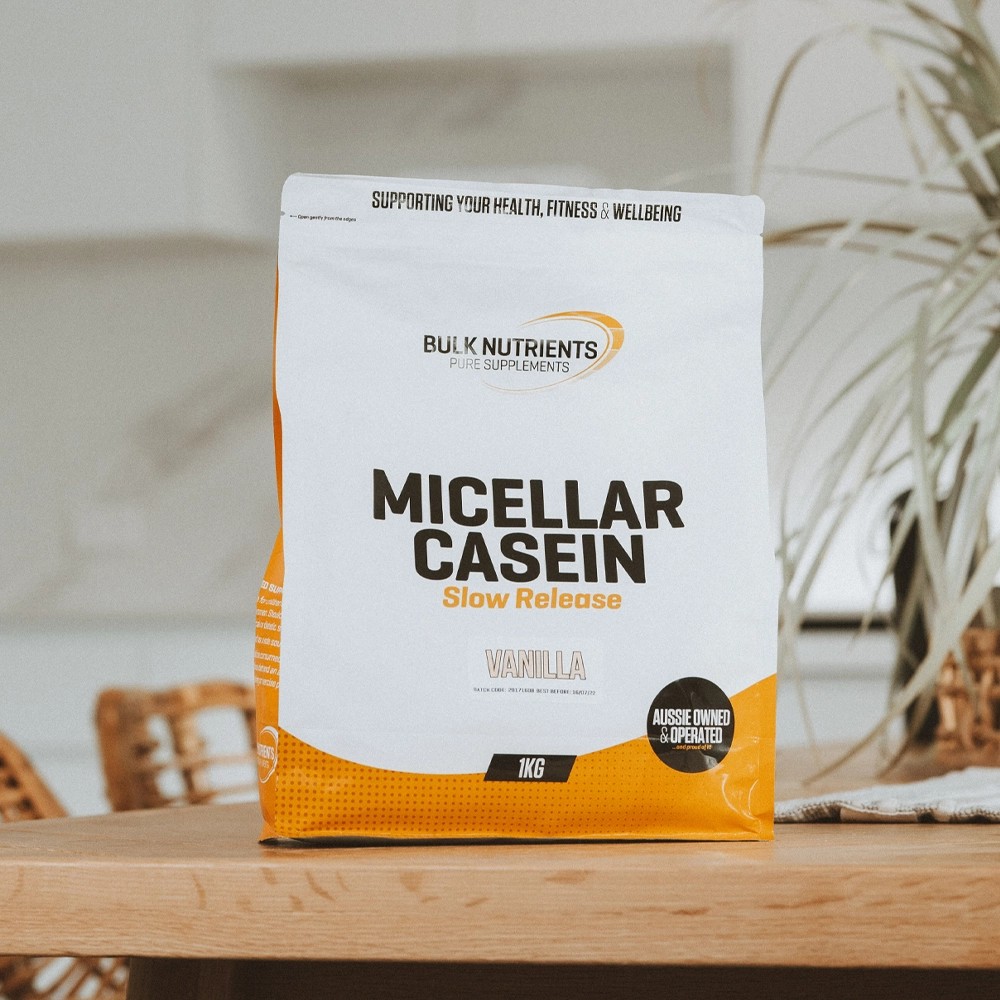Why Casein is One of the Best Protein Supplements You Can Take

A bedtime protein shake can help you reach your goals
Most of us will be quite aware that a high daily protein intake (~2g per kg of body weight) is required to maximise adaptations to weight training. These adaptations are of course gains in strength and muscle mass. For athletes with high training loads or those of us with frantic lifestyles or complex schedules, reaching that daily protein requirement can be a challenge.
A high protein requirement and a busy schedule can be a recipe for compromised nutritional strategies that delay muscle growth over time. Thus, to avoid “spinning our wheels” in the gym so to speak, implementing strategies to reach our daily protein threshold is paramount.
When looking inwards at our daily protein habits, most people will land at the post-workout protein shake solution as the first port of call. A wise and valuable strategy no doubt, however, I believe the importance of pre-sleep protein is just as valuable, and heavily overlooked by most.
What is casein and why is it the pre-sleep protein king?
We all know pre-sleep protein is important but does the protein source matter? The two most popular and well-researched protein powder sources are casein and whey.
Both of these proteins are derived from milk, yet they differ significantly in their capacity for maximising night-time anabolism. Both whey and casein are still high quality, complete proteins (meaning they contain all the essential amino acids for building new muscle protein) and are digested and absorbed readily.

To make whey and casein, special enzymes are added to warmed milk, causing the milk to coagulate and separate into solid and liquid portions. The liquid is the whey (which is washed and dried into powder), while the remaining curds are washed and dried to form casein powder. Now the rates of digestion and absorption are where these two proteins really differ. While whey digests quickly and may be a wise choice post-workout to cause a rapid increase of amino acids in the bloodstream, casein is digested very slowly, gradually releasing amino acids into the bloodstream over many hours. This is why you might notice that casein protein does not digest as well or as fast in your shaker. This is also why casein is a standout choice for a pre-sleep protein, keeping a relatively stable and high level of aminoacidemia (concentration of amino acids in the blood) while you’re not eating for 6-10 hours.
To learn more about the difference between whey and casein proteins, check out our blog on fast and slow-release proteins.
Pre-sleep casein after evening workouts leads to more muscle mass and strength gains
It is important to note that protein consumed before sleep is digested and absorbed at the same rate as when we are awake. The muscle still responds to a high concentration of amino acids in the blood during sleep by increasing muscle protein synthesis.
In a previous 12-week study this point was highlighted when a group consuming casein protein before sleep, after an evening weight training workout gained more strength and muscle mass than a group performing only the weight training, without the casein protein before bed.

Late-night protein doesn’t slow rates of fat loss while sleeping
It seems as though many lifters and athletes out there are hesitant to consume protein (or any calories for that matter) late at night in fear of disrupting body fat loss during sleep. However, the research tells us we have no reason to be frightened from late-night protein.
Several studies have indeed shown that supplemental casein protein before bed does not negatively impact rates of lipolysis (release of body fat into the blood) or fatty acid oxidation (fat burned for energy). Interestingly, in a small study of 11 active men, a pre-bed casein shake actually INCREASED rates of fat oxidation the next day. I think we can say at the bare minimum, that pre-bed protein, particularly casein, won’t make you fat while you sleep.
Will having casein protein before bed interrupt my sleep?
Thankfully, several research studies have shown that pre-bed protein consumption does not affect sleep quality scores or sleep onset latency.
Why sleep is a special opportunity for muscle growth and recovery
We know new muscle tissue only grows, or existing muscle tissue repairs when the amino acids from protein (the building blocks) are available in the bloodstream. This is akin to muscle glycogen storage only occurring when there is available glucose in the bloodstream. But for protein it isn’t so simple, the body doesn’t store and release amino acids to maintain a constant circulation in the blood. Glucose does, otherwise, we would go hypoglycaemic and die! And so, a slow-digesting protein, a steady supply of amino acids into the blood while you sleep could significantly improve protein intake distribution over 24 hours, preventing levels from falling to a degree that might risk catabolism.
In a survey of over 500 athletes, the researchers found that the athletes were typically consuming at least 1.2g of protein per kg of body weight per day, however, on average were only consuming a total of 7g of protein in their final evening snack. This means it’s highly likely that while daily protein requirements may be met, low levels of amino acids in the blood during sleep may compromise night-time muscle growth.

If I have more protein at night, won’t that just mean I need less during the day?
Not exactly. In one study consuming 60g of protein powder before sleep did not change the muscle protein stimulus-response to a high protein breakfast the next morning. This tells us that the muscle growth effects of night-time protein appear to be additive.
Additionally, for those not tracking calories, having a night-time casein shake doesn’t appear to affect appetite the next morning. This means you don’t have to worry about not being able to stomach a high protein (or high calorie if need be) breakfast.
The bottom line? Prioritise protein for your goals
Your total daily protein intake is still going to be the strongest predictor of how much strength and muscle you gain from your weights program. With that said, having a more even spread of this protein intake over 24 hours preventing amino acids from reaching low levels in the blood is likely to prevent catabolism and/or enhance anabolism compared to only consuming faster digesting proteins during waking hours.
Casein protein is your best option for a pre-sleep protein, as amino acids are gradually released into the bloodstream over many hours. Perfect for when you’re asleep and not eating. A worthy investment for anyone looking for a small edge on top of the competition.

Jackson Peos
Jackson Peos has completed a PhD at the University of Western Australia, and has a straightforward approach to nutrition and supplements.
He's completed his BSc in Sports Science, and Exercise & Health, and his BSc (Hons) in Exercise Physiology.
References:
- Snijders T, Res PT, Smeets JS, van Vliet S, van Kranenburg J, Maase K, Kies AK, Verdijk LB, van Loon LJ. Protein ingestion before sleep increases muscle mass and strength gains during prolonged resistance-type exercise training in healthy young men. J Nutr. 2015;145:1178–1184.
- Antonio J, Ellerbroek A, Peacock C, Silver T. Casein protein supplementation in trained men and women: morning versus evening. Int J Exerc Sci. 2017;10:479–486.
- Res PT, Groen B, Pennings B, Beelen M, Wallis GA, Gijsen AP, Senden JM, Vanl LJ. Protein ingestion before sleep improves postexercise overnight recovery. Med Sci Sports Exerc. 2012;44:1560–1569.
- Kinsey AW, Cappadona SR, Panton LB, Allman BR, Contreras RJ, Hickner RC, Ormsbee MJ. The effect of casein protein prior to sleep on fat metabolism in obese men. Nutrients. 2016;8(8):452.
- Madzima TA, Panton LB, Fretti SK, Kinsey AW, Ormsbee MJ. Night-time consumption of protein or carbohydrate results in increased morning resting energy expenditure in active college-aged men. Br J Nutr. 2014;111:71–77.
- Boirie Y, Dangin M, Gachon P, Vasson MP, Maubois JL, Beaufrere B. Slow and fast dietary proteins differently modulate postprandial protein accretion. Proc Natl Acad Sci U S A. 1997;94:14930–14935.
- Dangin M, Boirie Y, Garcia-Rodenas C, Gachon P, Fauquant J, Callier P, Ballevre O, Beaufrere B. The digestion rate of protein is an independent regulating factor of postprandial protein retention. Am J Physiol Endocrinol Metab. 2001;280:E340–E348.
- Joy JM, Vogel RM, Shane Broughton K, et al. Daytime and nighttime casein supplements similarly increase muscle size and strength in response to resistance training earlier in the day: a preliminary investigation. J Int Soc Sports Nutr. 2018;15(1):24. Published 2018 May 15. doi:10.1186/s12970-018-0228-9
Related Blogs

Fast or Slow Release Proteins. Which Is Better for You?
Posted by Ellie Hearn
Estimated reading time: 7 minutes

Why Should You Use Micellar Casein?
Posted by Bulk Nutrients
Estimated reading time: 7 minutes

How Fast Does My Protein Powder Digest?
Posted by Bulk Nutrients
Estimated reading time: 6 minutes














































